|
|
|
Sort Order |
|
|
|
Items / Page
|
|
|
|
|
|
|
| Srl | Item |
| 1 |
ID:
060963
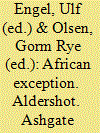

|
|
|
|
|
| Publication |
Aldershot, Ashgate Publishing, 2005.
|
| Description |
xi, 176p.
|
| Series |
Contemporary perspectives on developing societies
|
| Standard Number |
075463695X
|
|
|
|
|
|
|
|
|
|
|
|
Copies: C:1/I:0,R:0,Q:0
Circulation
| Accession# | Call# | Current Location | Status | Policy | Location |
| 049532 | 320.96/ENG 049532 | Main | On Shelf | General | |
|
|
|
|
| 2 |
ID:
052917
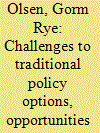

|
|
|
| 3 |
ID:
074226


|
|
|
|
|
| Publication |
2005.
|
| Summary/Abstract |
The paper discusses a still more obvious foreign policy dilemma facing Denmark: On the one hand, Denmark has made a proactive foreign policy decision to pursue a strategy of influence with the European Union as the most important international forum. On the other hand, Denmark has chosen to stay outside the increasingly important cooperation on defence policy within the EU. As a small state, Denmark is opting for a multilateral strategy, but it has deliberately chosen to limit its commitment to the same forum. A combination of adaptation theory and theory of small states informs the analysis. It is argued that the Danish opt-out sends an unclear and inconsistent signal to Denmark's partners which again hampers the possibilities for using Danish coalition power within the EU. Nevertheless, contrary to both theoretical expectations and common sense intuition, there is little to suggest that the opt-out has had negative consequences for Denmark's influence on capabilities in the EU.
|
|
|
|
|
|
|
|
|
|
|
|
|
|
|
|
| 4 |
ID:
087831
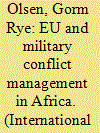

|
|
|
|
|
| Publication |
2009.
|
| Summary/Abstract |
During the 1990s, conflict prevention and conflict management became core priorities of the European Union's policy towards Africa. In the current decade, conflict management with military means has become increasingly important to the EU. The article scrutinizes the efforts of the EU to develop a military conflict management policy and it shows the dynamics and the interests lying behind the two core instruments: EU military operations within the framework of the Common Foreign and Security Polity (CFSP) / European Security and Defence Policy (ESDP) and the funding of 'African solutions to African problems'. It is the argument that development of a military conflict management policy has been and still is motivated by European concerns and European interests. Only secondly is it motivated by concerns for Africa. Because CFSP/ESDP conflict management is guided by the principle of intergovernmentalism, some member states, particularly France, exert significant influence on the EU's conflict management policy in Africa.
|
|
|
|
|
|
|
|
|
|
|
|
|
|
|
|
| 5 |
ID:
131632
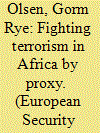

|
|
|
|
|
| Publication |
2014.
|
| Summary/Abstract |
The French intervention in Mali in early 2013 emphasizes that the decision-makers in Paris, Brussels, and Washington considered the establishment of the radical Islamist regime in Northern Mali a threat to their security interests. The widespread instability including the rise of radical Islamist groups in Somalia was perceived as a threat to western interests. It is the core argument of the paper if western powers decide to provide security in Africa, they will be inclined to use proxy instead of deploying own troops. Security provision by proxy in African means that African troops are doing the actual fighting and peacekeeping on the ground while western powers basically pay the costs, the logistics, and the training of local African troops. The paper concludes that the African Union Mission in Somalia (AMISOM) in Somalia and The African-led International Support Mission to Mali (AFISMA) in Mali are proxies for the USA and the European Union.
|
|
|
|
|
|
|
|
|
|
|
|
|
|
|
|
| 6 |
ID:
056961
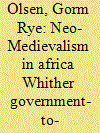

|
|
|
| 7 |
ID:
082348
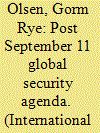

|
|
|
|
|
| Publication |
2008.
|
| Summary/Abstract |
The Africa policies of the United States and of the European Union seem to have undergone significant changes in the years following September 2001. Nevertheless, the paper shows that the choice of policy instruments has been path dependent in both cases. The American policy is not totally path dependent if the size of the military initiatives and the volume of development aid are included in the analysis. The Africa policy of the EU is path dependent even when the increase in development assistance is taken into account. The growth in EU aid can only be explained by reference to the influence of values and norms. Even though September 11 is a 'breaching point', path dependency and bureaucratic inertia seem to be able to explain most of the lacking changes. However, agency-based explanations are also necessary
|
|
|
|
|
|
|
|
|
|
|
|
|
|
|
|
| 8 |
ID:
187303
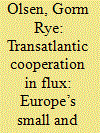

|
|
|
|
|
| Summary/Abstract |
The existing, liberal world order is under pressure and transatlantic cooperation on security is challenged. The paper raises the question, why have the European steps and policy initiatives towards addressing the new international threats and challenges to Europe been so limited and cautious. The first argument states it is because the European decision-makers were unable to agree when it came to implementing salient and concrete policies addressing new security threats and building strategic autonomy. The second argument states that the European decision-makers were only able to reach agreement on diffuse and symbolic policy ideas like building “strategic autonomy” for the European Union. The third argument states that the Europeans were able to address some of the new security challenges if it took place within NATO. The analysis shows that the European responses and reactions to the increasing tensions in the Indo-Pacific were subdued. The Europeans were unable to launch any concrete reactions to the American unilateral abrogation of the Iranian nuclear deal, to the unilateral American policy initiatives in the Israel-Palestine conflict or to the US withdrawal from Afghanistan. However, the Europeans increased the level of their defense spending and they also cooperated closely with their transatlantic partner to counter the assertive Russian foreign policy behavior.
|
|
|
|
|
|
|
|
|
|
|
|
|
|
|
|
| 9 |
ID:
158112
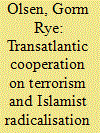

|
|
|
|
|
| Summary/Abstract |
Transatlantic cooperation on security has a long history. In Africa, transatlantic cooperation on security is basically between France and the United States. This paper asks why the two former competitors in Africa started to cooperate and also why they are so willing to engage militarily. The central argument in this paper poses that France and the US cooperate because it is indispensable to both parties. To France, the cooperation is indispensable because the US is the only power with sufficient financial means and with sufficient air-lift capacity to transport French and African troops into conflict-ridden countries. To Washington, cooperation with Paris is indispensable because the French authorities have unique access to intelligence and knowledge about large parts of Africa. By applying a foreign policy analysis framework, the paper analyses how perceptions of decision-makers, the role of personality and leadership, the role of government institutions and political systems have impacted the relevant decisions. It is emphasised that the two different decision-making systems – the French “state dominated” and the American “society dominated” – produce the same result, namely collaboration. It suggests that the perception of a serious threat from terrorism and Islamist radicalisation overrules differences in decision-making systems.
|
|
|
|
|
|
|
|
|
|
|
|
|
|
|
|
| 10 |
ID:
126057
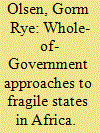

|
|
|
|
|
| Publication |
2013.
|
| Summary/Abstract |
or a number of years fragile states have been high on the foreign policy agendas of the USA and the EU. Both actors look upon fragile states with great concern and consider them as security threats. Officially they give priority to 'whole-of-government approaches' (wga) when addressing the threats from these states. However, there is a gap between the policy declarations and the policies implemented by the two actors. The missing link in the implementation of wga in Africa is explained by two variables: on the one hand, material interests in the continent and, on the other hand, the institutions in Washington and Brussels involved in policy making. It is the lack of a strong foreign policy priority for Africa that explains the inadequate US implementation of wga. In the case of the EU, it is the multitude of institutions and institutional interests that explains the lack of implementation, rather than a lack of European interests in the fragile states on continent.
|
|
|
|
|
|
|
|
|
|
|
|
|
|
|
|
|
|
|
|
|